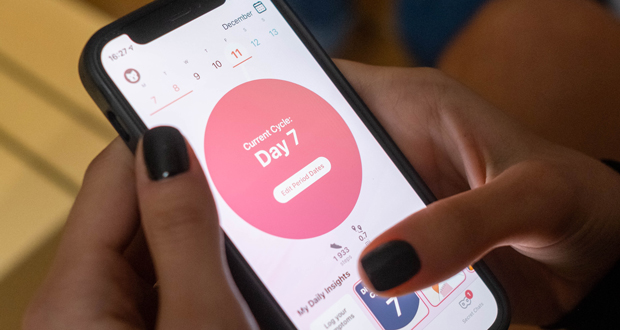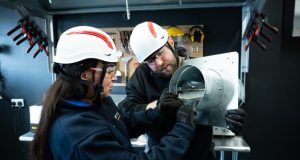Initial Washroom Hygiene has unveiled two market-leading innovations – the Signature Lite White Eco Mini and the Initial In Cubicle Period Dignity Dispenser – to help provide a dignified washroom experience for those who menstruate.
The launch of these two new innovations is in direct response to consumer demand, with new research revealing that the majority (78 per cent) of UK women believe that public washroom facilities need to be more accommodating of menstrual hygiene. It is part of a new nationwide campaign from Initial Washroom Hygiene that aims to deliver ‘Washroom Dignity’ for everyone, which sees the company partner with leading charity Freedom4Girls to raise awareness of the issues surrounding menstrual hygiene.
Signature Lite White Eco Mini
The research shows that a lack of cubicle space is a major concern for women who currently menstruate or have in the past, with six in ten (61 per cent) arguing that there is often not enough room for a standard sanitary waste bin. Cramped cubicles are also resulting in unhygienic practices, with 59 per cent of women stating that they have accidentally touched sanitary waste bins when using a washroom cubicle. As a result, nearly half (46 per cent) said that they have resorted to using disabled washrooms for more privacy and space.
The new compact menstrual waste bin, the Signature Lite White Eco Mini, can be placed alongside the toilet – even in the smallest of cubicles – meaning washroom users can have more space and comfort. It has a capacity of 10 litres and features an optional wall bracket, which allows the bin to be lifted off of the floor, optimising cleaning access and hygiene.
Initial In Cubicle Period Dignity Dispenser
Earlier research shows that the overwhelming majority of those who menstruate (94 per cent) would like to see feminine hygiene provisions supplied in the actual toilet cubicles of public washrooms, with 55% wanting to see spare period products included. Additionally, 43 per cent would like disposable bags to be available in cubicles to discreetly dispose of used products, whilst 36 per cent want moist wipes for use on sensitive skin.
The Initial In Cubicle Period Dignity Dispenser provides access to both reusable or traditional period products within a toilet stall, to give the utmost privacy at the point of need. It features a new range of washable period pants, eco-friendly reusable pads, personal wipes, biodegradable compostable bags, menstrual cups, and organic tampons and towels.
Discussing the latest innovations, Sian Walkling, Head of Marketing for Initial Washroom Hygiene and Ireland comments: “We have worked hard to take into consideration the real needs of real people. Menstrual products are evolving – with new organic solutions, menstrual cups and reusable options like period pants and washable pads now becoming more popular, particularly with the cost and sustainability benefits they offer – so washroom facilities must evolve too. We hope that our new innovations help businesses provide washroom facilities that empower everyone to feel more comfortable and welcome.”
Commenting on reusable options, Joanna Kirk, Managing Director of supplier Femme Tasse, said: “We have worked out that each woman will use up to 12,000 pads, tampons or other disposable menstrual products. This amounts to a shocking quantity of waste – to be precise, that is 150 kilograms per woman, or enough to fill two mini buses. On top of that, women spend around £18,450 over their lives on period products, which is where the newer reusable options can make a huge difference both in our pockets and to the planet too.”
The state of washroom provisions
The research also shows that the state of washrooms in places of work is impacting the return to offices for some. Six in 10 women (59 per cent) indicate that they would prefer to work from home when on their period to access better facilities, with those aged 18-34 the most keen to avoid education facilities or the office when menstruating (65 per cent).
Discussing the research, Walkling commented: “Everyone deserves the right to a dignified experience when using a washroom or when on their period, but for that to happen we need to ensure facilities are up to standard. Today’s research reveals the shocking lack of support those who menstruate often receive and businesses must now address this. We can’t expect people to return happily to offices or public spaces if they do not have proper washroom facilities available to them.”
Tina Leslie, MBE and founder of the charity Freedom4Girls added: “No woman should be forced to miss work or the opportunity to be in a public space just because they’re on their period. We envisage a world in which no one suffers from period poverty or the stigma associated with periods, and where menstrual hygiene products are readily accessible for anyone where and when they need them. We have a lot of work left to make this a reality, and we hope this research helps to raise awareness of what needs to be done.”





